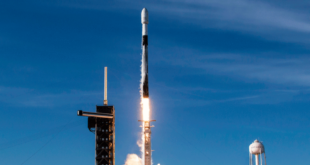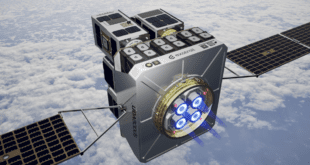 As part of the partnership between SpaceWatch.Global and ORF, we have been granted permission to publish selected articles and texts. This is “A new French Space Command”, originally published Oct 5, 2019 in the ORF Space Alert, Vol VII, Issue 4.
As part of the partnership between SpaceWatch.Global and ORF, we have been granted permission to publish selected articles and texts. This is “A new French Space Command”, originally published Oct 5, 2019 in the ORF Space Alert, Vol VII, Issue 4.
Dr. Xavier Pasco
On a hot 25 July this year, the French Ministry of the Armed forces, Mrs. Florence Parly, announced a new national “Space Defense Strategy” and the creation of a new French Space Command starting from 1st September 2019. Beyond the announcement itself, this speech has touched upon a series of issues supporting the move that clearly made this official speech unprecedented in the French military space history. Most of the media has realized this and what looked like a small revolution in the eyes of many, not only abroad but also in France, has been widely reported. Of course, from a public opinion perspective and for the large audience, the matter has appeared particularly sensitive also because it was taking place in the context of the year-long U.S. debate about a “Space Force”. For the non-specialist, with this political announcement, France would then supposedly embrace the Trump administration’s stance, and would even act more quickly by creating its own “Space Force” after the summer. As we will see, if only from an institutional perspective, nothing may be more different from what has actually been decided. More generally, to an experienced observer, the announcement and associated developments could hardly be considered a surprise.
The roots of the decision
Before coming to some of the specific points highlighted in the speech in July, it is advisable to go back a little to better understand the evolution of the French thinking about military space. Indeed, this new “Space Defense Strategy” has come a long way. More than ten years ago, space was officially hailed (for the first time) as a key element of the national military posture. The “Defense and Security White Book” published in 2008 was the first official document emanating from any French government which underlined the importance of military space and put it at the center of a newly created “strategic function” entitled “Knowledge and anticipation”. The creation of this new function itself resulted from an analysis of the new challenges and key emerging threats for international and homeland security since 2001. Until then, space had traditionally addressed high-level strategic needs defined during the cold-war years, mostly for ensuring intelligence and monitoring and notably in support of the nuclear deterrence policy adopted decades ago during the Gaullist era. Satellites have always been considered mostly as intelligence tools reserved for high-level users, and representing a crucial asset in strategic decision-making processes dealing with strategic issues. While still true, other considerations have been taken into account in bringing about these new changes. Moreover, given the evolution of the geostrategic landscape in the 2000s, strategic intelligence has not remained the sole objective assigned to military space system. In 2008, the new White book made it a priority to adapt the national military apparatus to the new threats and it quickly appeared that space capabilities would represent invaluable assets by being tailored and reorganized to deal precisely with those new threats.
The first creation of a Joint Space Command in 2010
This move has materialized at the time through the creation of a “Joint Space Command”, a rather modestly staffed structure but highly positioned in the institution and soon to become a key step in helping space find its way in the new military thinking. The role of the JSC (CIE in French for Commandement Interarmées de l’Espace) was to harmonize widely spread competences inside the Ministry (Mostly between the Military Directorate for Intelligence (DRM) that operates military Observation and ELINT satellites; the telecommunication Directorate (DIRISI) that operates the military telecommunication satellites and the Air Force Defense Operation Command (CDAOA) that takes care of space surveillance and monitoring) in order to make them more responsive to real military use on the ground, mostly for supporting external operations.
Quickly, this new organization would be put at test with the first external operation undertaken in Mali (Code-worded “Serval operation”) decided by the then French President François Hollande to help disrupt Islamist-Jihadist worrying moves detected in southern Mali and to push them back up North. Recognized as a military success characterized by swift use of rapid forces in high tempo mobile operations, Serval was also acknowledged as the first real-size operation having made such an extensive use of space systems. For example, the capability to rapidly map largely unknown territories, to detect and identify elusive enemies, or to better assess targeting opportunities and damages have largely convinced the French military establishment of the key role played by space assets in modern war operations.
Very clearly, on-going external military operations conducted without any interruption by France since Serval have only confirmed this fact. And for a few years already, the growing dependency of France on its space systems has been considered as an undisputed fact by most specialists and observers. From then on, satellites would not only be used to ensure political autonomy at strategic levels, but it would also be used for conducting real military operations. For France, this was rather new. The feeling of this growing “military dependency” partly led to the project of consolidating what had been started in 2010 with the project of a reinforced “Space Command” that would enjoy a more operational “weight” in the system over time.
The new Space Command seen as a reinforcement of the military role of space
This partly explains the decision made by President Emmanuel Macron in 2018 to ask for a new “Space Defense Strategy”, giving the start to a largely revamped posture in space leading to the creation of this new organization. First, this New Space Command will transition from a mere 30 officer-“Joint Space Command” to a more than 200-uniformed military-organization, before gaining more personnel over time, possibly up to several hundreds. The need for an operation driven “Command” also explains why it will be located under the auspices of the French Air Force (that shall be renamed “Air and Space Force”). This is certainly where the conception of this new French Space Command radically differs from the U.S. Space Force concept, which is supposed to stand by itself as a brand new military service as and when it gets operational. The French move giving more weight to the Air Force in the space domain might well represent something many in the U.S. Air Force would not even dare to dream.
Another important element is linked to the relocation of most of the technical services of this Space Command in Toulouse, a city lying in the south-west of France where the main technical centers of the French space agency CNES is already located. This decision reflects the objective of giving the military a full operational control on the military satellites, with uniformed personnel actually operating them. This is also new in the French organization. Until then, CNES specialists were technically operating the French military satellites on behalf of the defense establishment. This will change and this has motivated this relocation.
Beyond the organizational change itself, this is not anecdotic. It tells a lot about the new perceptions of the space environment by the ministry. The “Defense Space Strategy” underlines the necessity to prepare for deploying an “active defense” and thus for potential military actions in space. This means that, along with the perceived growing dependency mentioned earlier, new threats are also considered as a given fact, with the space landscape expected to become even fuzzier due to a growing number of objects, which means, for the military, a more hostile and possibly a more dangerous environment they have to prepare for. Hence, the rather “right-on-target” style of the ministry speech and the mention of technological developments in the field of SSA and some directed-energy systems, namely lasers, possibly installed on satellites for “self-defense” (as characterized in the speech).
This coincidence of the increased French military dependency on space and the perception of a more hostile environment must be seen as one of the key reasons behind this reorganization. Let us just hope that the current difficult international discussions for more collective security in space will finally succeed and help possibly conceive such military developments as simply guard rails without any other consequence.
Dr. Xavier Pasco is Director at the Fondation pour la Recherche Stratégique (FRS) based in Paris where he is in charge of the Department “Technology, Space and Security”.
The original can be find here –https://www.orfonline.org/research/space-alert-volume-vii-issue-4-56195 Rights reserved – this publication is reproduced with permission.





